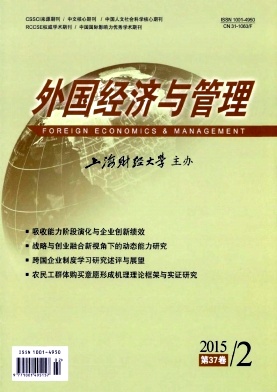吸收能力阶段演化与企业创新绩效——基于上海市高新技术产业的经验分析
外国经济与管理 2015 年 第 37 卷第 02 期, 页码:3 - 17
摘要
参考文献
摘要
在信息化和全球化背景下,外部知识获取已成为企业保持竞争优势的重要源泉,其中吸收能力被认为是企业创新赖以成功的主要因素。基于已有研究,本文运用135个针对企业的调查样本,使用结构方程模型(SEM)探究吸收能力三阶段对创新绩效的影响关系。研究发现,转化性和开发性学习阶段对企业创新绩效存在正向显著影响,探索性学习对其影响不显著。鉴于外部因素对企业创新的作用,本文还加入环境动荡性这一调节变量,分析三阶段演化过程及交互作用对企业创新绩效的影响。本文的理论贡献在于明确了这些变量之间相互影响的路径,对于正确理解吸收能力的阶段演化与创新绩效的作用机理具有重要意义。
[1]Alegre J and Chiva R.Linking entrepreneurial orientation and firm performance:the role of organizational learning capacity and innovation performance[J].Journal of Small Business Management,2013,51(4):491-507.
[2]Benner M J and Tushman M L.Exploitation,exploration,and process management:the productivity dilemma revisited[J].Academy of Management Review,2003,28(2):238-256.
[3]Bouchaib B,et al.The role of absorptive capacity in information technology outsourcing and innovation performance:a moderated mediation analysis[C].2014 46th Hawaii International Conference on System Sciences,2014:4635-4644.
[4]Cohen W M and Levinthal D A.Absorptive capacity:a new perspective on learning and innovation[J].Administrative Science Quarterly,1990,35(1):128-152.
[5]Droge C,et al.New product success:is it really controllable by managers in highly turbulent environments?[J].Journal of Product Innovation Management,2008,25(3):272-286.
[6]Duncan R B.Characteristics of organizational environments and perceived environmental uncertainty[J].Administrative science quarterly,1997(a):313-327.
[7]Dutta D K.Benefiting from your buddy-a conceptual exploration of the links between social capital and firm innovative capability under environmental turbulence[J].American Journal of business,2013,28(2):192-209.
[8]Escribano A,et al.Managing external knowledge flows:the moderating role of absorptive capacity[J].Research Policy,2009,38(1):96-105.
[9]Fosfuri A and Tribo J A.Exploring the antecedents of potential absorptive capacity and its impact on innovation performance[J].Omega,2008,36(2):173-187.
[10]Govindarajan V and Kopalle P K.Disruptiveness of innovations:measurement and an assessment of reliability and validity[J].Strategic Management Journal,2006,27:189-199.
[11]Gupta A K,et al.The interplay between exploration and exploitation[J].Academy of Management Journal,2006,49(4):693-706.
[12]Jaworski B J and Kohli A K.Market orientation:antecedents and consequences[J].Journal of Marketing,1993,57:53-71.
[13]Kam S and Wang S.Impact of environmental turbulence on entrepreneurial orientation and new product success[J].European Journal of Innovation Management,2014,17(2):229-249.
[14]Kohlbacher M,et al.Innovation in clusters:effects of absorptive capacity and environmental moderators[J].Competitiveness Review:An International Business Journal,2013,23(3):199-217.
[15]Lane P J,et al.The reification of absorptive capacity:A critical review and rejuvenation of the construct[J].Academy of Management Review,2006,31(4):833-863.
[16]Moos B,et al.The role of knowledge management systems for innovation:an absorptive capacity perspective[J].International Journal of Innovation Management,2013,17(5):1-31.
[17]Nieto M and Quevedo P.Absorptive capacity,technological opportunity,knowledge spillovers,and innovative effort[J].Technovation,2005,25(10):1141-1157.
[18]Shenbarow A A.Absorptive capacity and organizational determinants:evidences of association[J].Engineering,Technology and In-novation,2014,(6):1-7.
[19]Song M,et al.Marketing and technology resource complementarity:an analysis of their interaction effect in two environmental contexts[J].Strategic Management Journal,2005,26(3):259-276.
[20]Teece D J.Explicating dynamic capacities:the nature and microfoundations of(sustainable)enterprise performance[J].Strategic Management Journal,2007,28(1):1319-1350.
[21]Todorova G and Durisin B.Absorptive capacity:valuing a reconceptualization[J].Academy of Management Review,2007,32(3):774-786.
[22]Tsai W.Knowledge transfer in intraorganization networks:effects of network position and absorptive capacity on business unit innovation and performance[J].Academy of Management Journal,2001,44(5):253-271.
[23]Tushman M L and O’Reilly C A.Ambidextrous organizations:managing evolutionary and revolutionary change[J].Managing Innovation and Change,1996,38(4):8-30.
[24]Vandeven A H and Poole M S.Explaining development and change in organizations[J].Academy of Management Review,1995,20(3):510-540.
[25]Zahra S A and George G.Absorptive capacity:a review reconceptualization,and extension[J].Academy of Management Review,2002,27(2):185-203.
[26]马文聪,朱桂龙.环境动态性对技术创新和绩效关系的调节作用[J].科学学研究,2011,(3):454-460.
[27]谢洪明,刘常勇,陈春辉.市场导向与组织绩效的关系:组织学习与创新的影响——珠三角地区企业的实证研究[J].管理世界,2006,(2):80-94、143、171-172.
[28]徐康宁,冯伟.基于本土市场规模的内生化产业升级:技术创新的第三条道路[J].中国工业经济,2010,(11):58-67.
[29]王菁娜,韩德昌.基于知识吸收能力视角的学习型战略联盟成因探析[J].科学管理研究,2011:69-72.
[30]王永贵,邢金刚,李元.战略柔性与竞争绩效:环境动荡性的调节效应[J].管理科学学报,2004,7(6):70-78.
[31]王雎,罗珉.基于关系性吸收能力的合作创新研究[J].科研管理,2008,(1):14-20.
[32]朱朝晖.探索性学习、挖掘性学习和创新绩效[J].科学学研究,2008,(4):860-867.
[33]朱少英,齐二石,徐渝.变革型领导、团队氛围、知识共享与团队创新绩效的关系[J].软科学,2008(11):1-4.
[2]Benner M J and Tushman M L.Exploitation,exploration,and process management:the productivity dilemma revisited[J].Academy of Management Review,2003,28(2):238-256.
[3]Bouchaib B,et al.The role of absorptive capacity in information technology outsourcing and innovation performance:a moderated mediation analysis[C].2014 46th Hawaii International Conference on System Sciences,2014:4635-4644.
[4]Cohen W M and Levinthal D A.Absorptive capacity:a new perspective on learning and innovation[J].Administrative Science Quarterly,1990,35(1):128-152.
[5]Droge C,et al.New product success:is it really controllable by managers in highly turbulent environments?[J].Journal of Product Innovation Management,2008,25(3):272-286.
[6]Duncan R B.Characteristics of organizational environments and perceived environmental uncertainty[J].Administrative science quarterly,1997(a):313-327.
[7]Dutta D K.Benefiting from your buddy-a conceptual exploration of the links between social capital and firm innovative capability under environmental turbulence[J].American Journal of business,2013,28(2):192-209.
[8]Escribano A,et al.Managing external knowledge flows:the moderating role of absorptive capacity[J].Research Policy,2009,38(1):96-105.
[9]Fosfuri A and Tribo J A.Exploring the antecedents of potential absorptive capacity and its impact on innovation performance[J].Omega,2008,36(2):173-187.
[10]Govindarajan V and Kopalle P K.Disruptiveness of innovations:measurement and an assessment of reliability and validity[J].Strategic Management Journal,2006,27:189-199.
[11]Gupta A K,et al.The interplay between exploration and exploitation[J].Academy of Management Journal,2006,49(4):693-706.
[12]Jaworski B J and Kohli A K.Market orientation:antecedents and consequences[J].Journal of Marketing,1993,57:53-71.
[13]Kam S and Wang S.Impact of environmental turbulence on entrepreneurial orientation and new product success[J].European Journal of Innovation Management,2014,17(2):229-249.
[14]Kohlbacher M,et al.Innovation in clusters:effects of absorptive capacity and environmental moderators[J].Competitiveness Review:An International Business Journal,2013,23(3):199-217.
[15]Lane P J,et al.The reification of absorptive capacity:A critical review and rejuvenation of the construct[J].Academy of Management Review,2006,31(4):833-863.
[16]Moos B,et al.The role of knowledge management systems for innovation:an absorptive capacity perspective[J].International Journal of Innovation Management,2013,17(5):1-31.
[17]Nieto M and Quevedo P.Absorptive capacity,technological opportunity,knowledge spillovers,and innovative effort[J].Technovation,2005,25(10):1141-1157.
[18]Shenbarow A A.Absorptive capacity and organizational determinants:evidences of association[J].Engineering,Technology and In-novation,2014,(6):1-7.
[19]Song M,et al.Marketing and technology resource complementarity:an analysis of their interaction effect in two environmental contexts[J].Strategic Management Journal,2005,26(3):259-276.
[20]Teece D J.Explicating dynamic capacities:the nature and microfoundations of(sustainable)enterprise performance[J].Strategic Management Journal,2007,28(1):1319-1350.
[21]Todorova G and Durisin B.Absorptive capacity:valuing a reconceptualization[J].Academy of Management Review,2007,32(3):774-786.
[22]Tsai W.Knowledge transfer in intraorganization networks:effects of network position and absorptive capacity on business unit innovation and performance[J].Academy of Management Journal,2001,44(5):253-271.
[23]Tushman M L and O’Reilly C A.Ambidextrous organizations:managing evolutionary and revolutionary change[J].Managing Innovation and Change,1996,38(4):8-30.
[24]Vandeven A H and Poole M S.Explaining development and change in organizations[J].Academy of Management Review,1995,20(3):510-540.
[25]Zahra S A and George G.Absorptive capacity:a review reconceptualization,and extension[J].Academy of Management Review,2002,27(2):185-203.
[26]马文聪,朱桂龙.环境动态性对技术创新和绩效关系的调节作用[J].科学学研究,2011,(3):454-460.
[27]谢洪明,刘常勇,陈春辉.市场导向与组织绩效的关系:组织学习与创新的影响——珠三角地区企业的实证研究[J].管理世界,2006,(2):80-94、143、171-172.
[28]徐康宁,冯伟.基于本土市场规模的内生化产业升级:技术创新的第三条道路[J].中国工业经济,2010,(11):58-67.
[29]王菁娜,韩德昌.基于知识吸收能力视角的学习型战略联盟成因探析[J].科学管理研究,2011:69-72.
[30]王永贵,邢金刚,李元.战略柔性与竞争绩效:环境动荡性的调节效应[J].管理科学学报,2004,7(6):70-78.
[31]王雎,罗珉.基于关系性吸收能力的合作创新研究[J].科研管理,2008,(1):14-20.
[32]朱朝晖.探索性学习、挖掘性学习和创新绩效[J].科学学研究,2008,(4):860-867.
[33]朱少英,齐二石,徐渝.变革型领导、团队氛围、知识共享与团队创新绩效的关系[J].软科学,2008(11):1-4.
引用本文
赵红岩, 蒋双喜, 杨畅. 吸收能力阶段演化与企业创新绩效——基于上海市高新技术产业的经验分析[J]. 外国经济与管理, 2015, 37(2): 3–17.
导出参考文献,格式为:





 6760
6760  754
754

